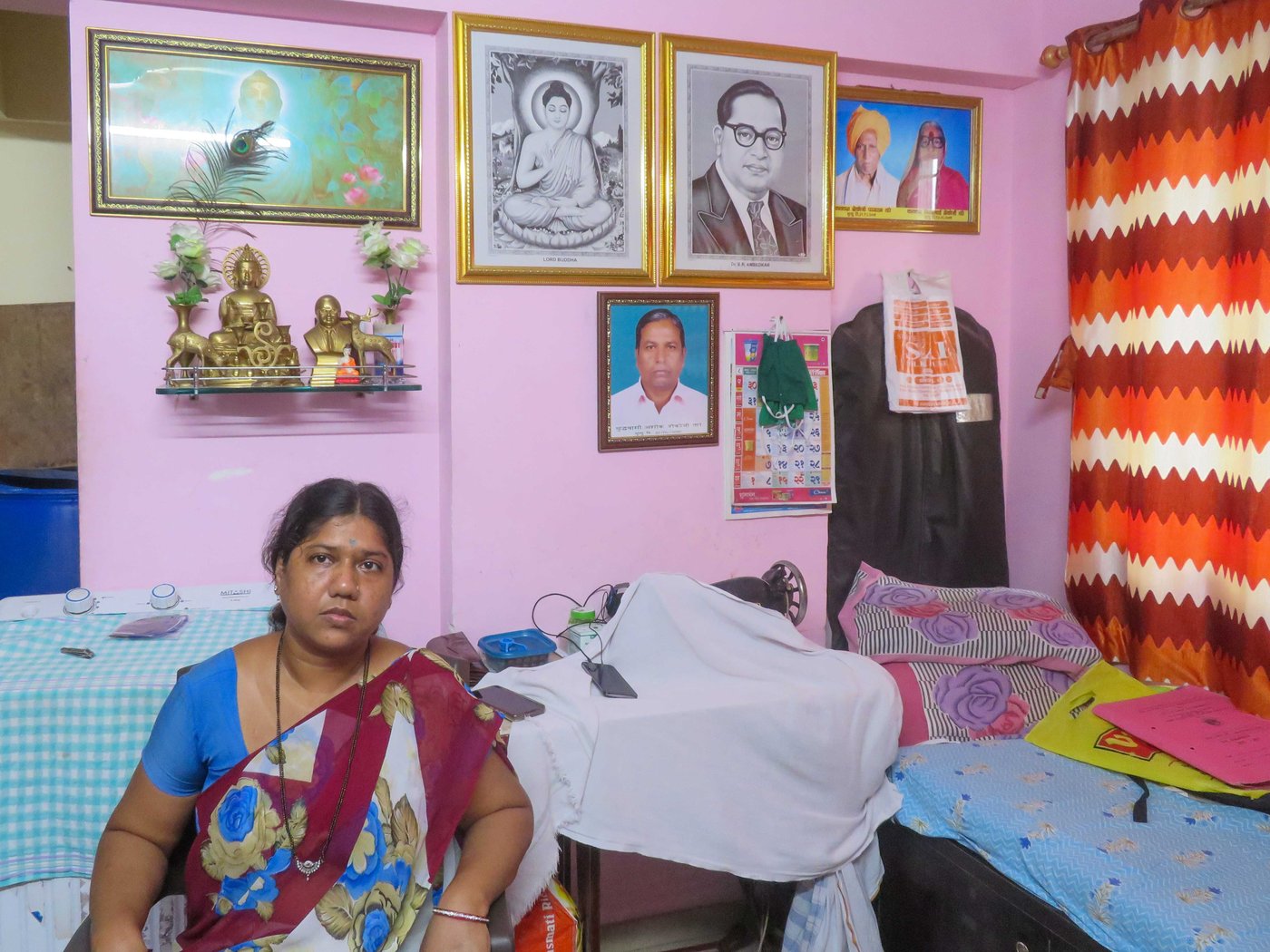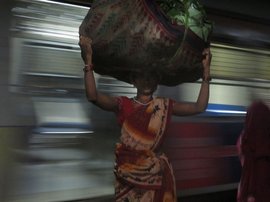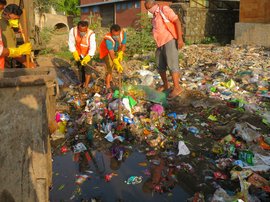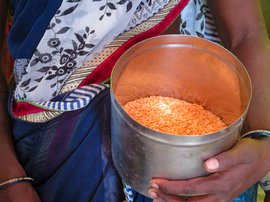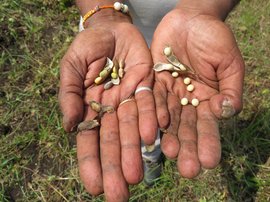“This photo of him would not be on the wall,” says Sheela Taare. “If he had been diagnosed in time, he would have been here today, with us.”
Below her husband Ashok’s photograph against a blue backdrop, is written, in Marathi: ‘Died on 30/05/2020’.
Ashok passed away at the KB Bhabha Hospital in Bandra in western Mumbai. The cause of death was a ‘suspected’ Covid-19 infection. He was 46 and a sanitation worker with the Municipal Corporation of Greater Mumbai (BMC).
Sheela, 40, holds back her tears. A silence permeates the family’s 269-square foot rented flat in a Slum Rehabilitation Authority building in Chembur in eastern Mumbai. Her sons Nikesh and Swapnil, and daughter Manisha, wait for their mother to speak.
“Sometime between April 8 and 10, when the mukadam of his chowki in Bhandup was found [Covid-19] positive,” Sheela continues, “they shut that chowki and asked all the workers to report to Nahur chowki [in the same area, in the city’s S ward]. After a week, he complained of difficulty in breathing.”
Ashok worked with a team on a garbage-gathering truck, picking up waste from various collection points in Bhandup. He didn’t wear any protective gear. And he was diabetic. He tried to draw the chief supervisor’s attention to his symptoms. But his requests for sick leave and for a medical test were ignored. Sheela remembers the day she accompanied Ashok to the Nahur chowki .
“I went with him to request saheb to allow him five days leave,” she says. Ashok, she adds, had not taken any of his 21 days of paid leave. “The saheb sitting on the chair said if everybody goes on leave, who will work in this situation?”
So Ashok kept working through April and May. His co-worker, Sachin Bankar ( name changed at his request ), says he could see Ashok trying hard to work.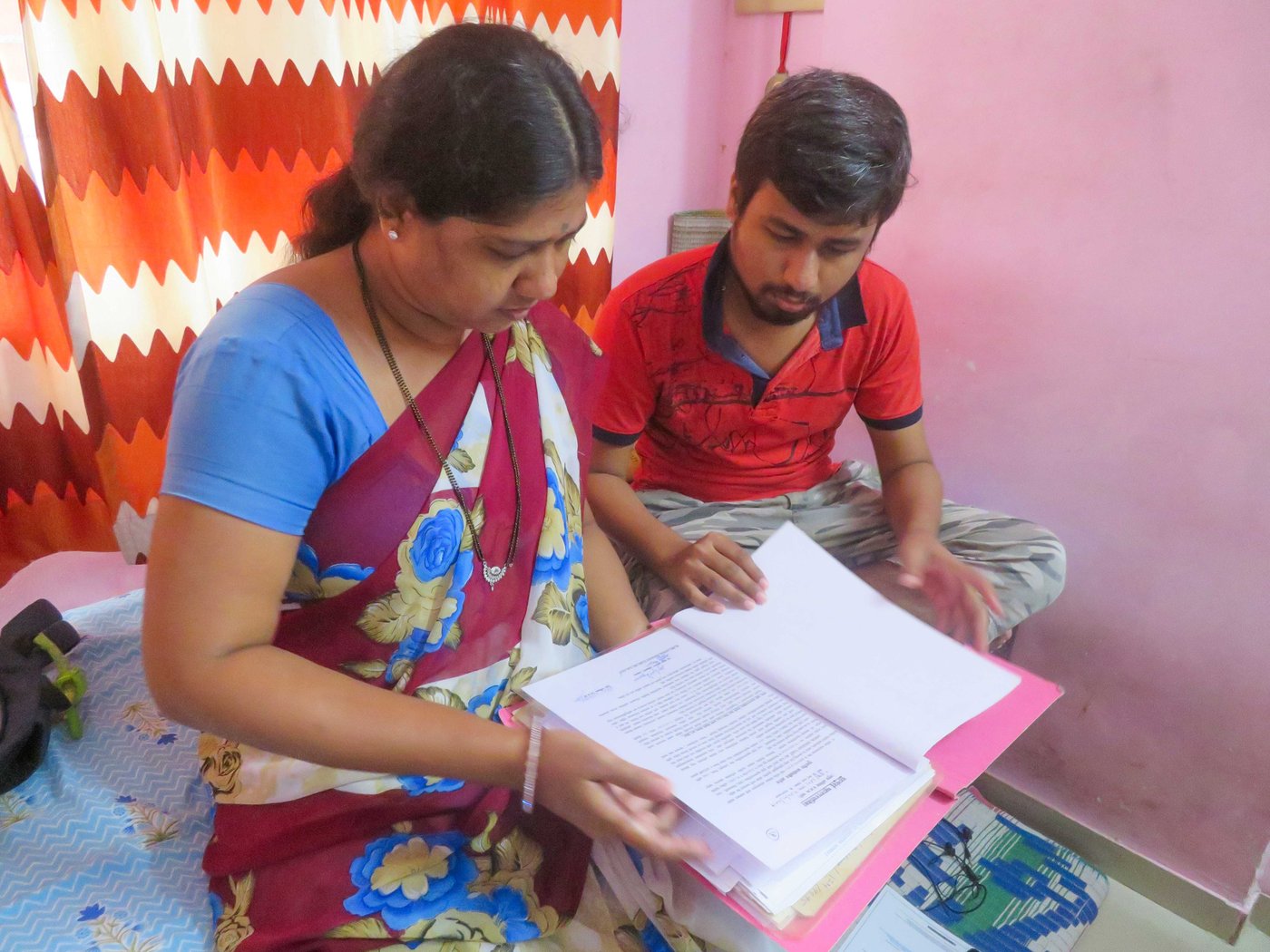
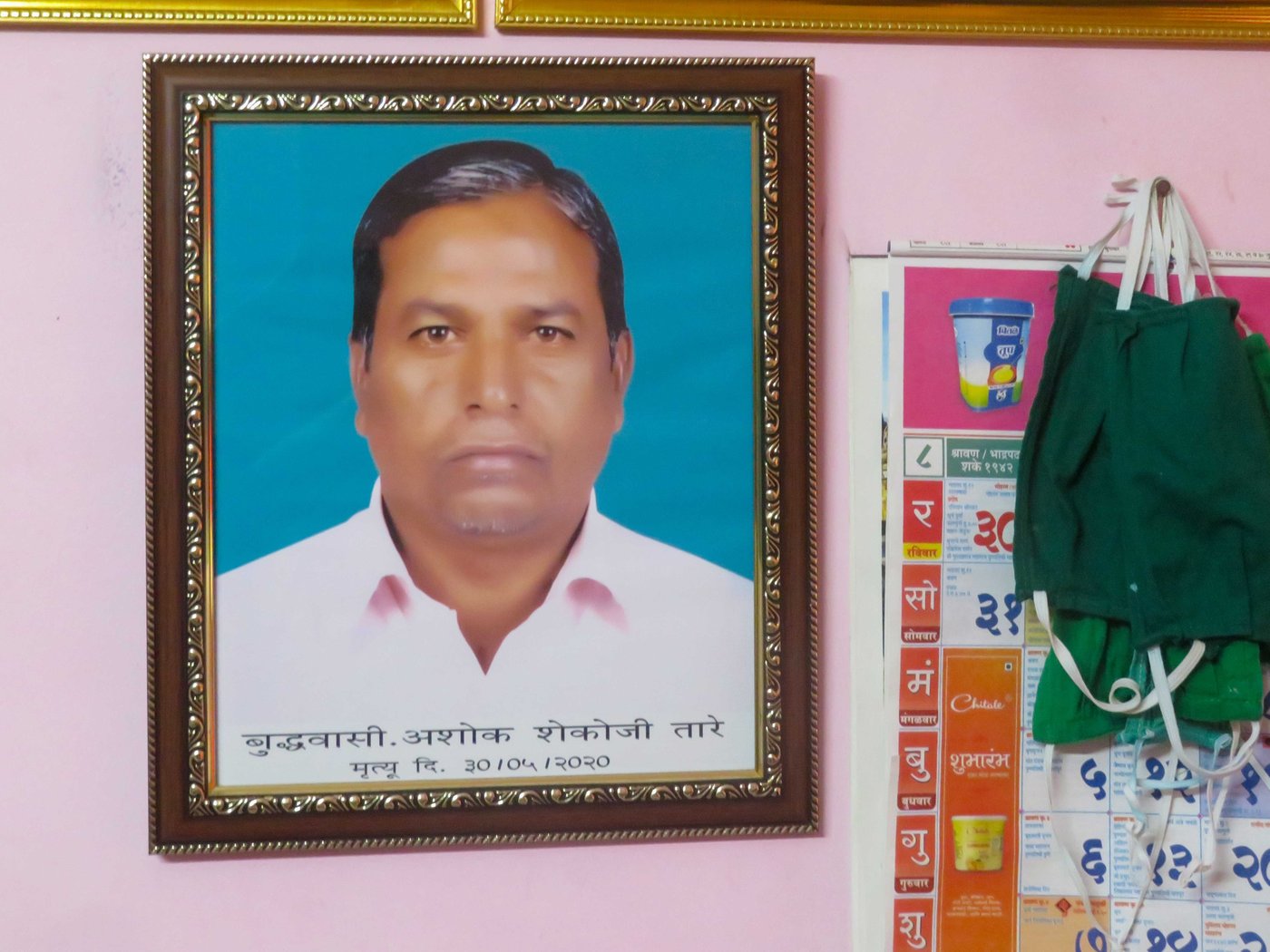
Sheela Taare (here with her son Nikesh) is still trying to get compensation for her husband Ashok's death due to a 'suspected' Covid-19 infection
“He was getting tired quickly and would struggle to breathe. But what could we do if saheb didn’t listen to us?” Sachin told me on the phone. “None of our chowki’ s workers, permanent or on contract, were tested for Covid-19. No one enquired if they had any symptoms after the mukadam tested positive. We were simply asked to report to another chowki .” (This reporter’s attempts to contact the mukadam , with the help of Sachin and other workers, to enquire about his health, were unsuccessful.)
It was only in the last week of July that Sachin and his co-workers were tested for Covid-19 at a BMC-run camp in their work area. “I don’t have any symptoms or illness,” Sachin says. “But we should have been tested in March-April as well, when the situation was grave.”
By April 5, S ward had recorded 12 Covid positive cases. By April 22, the number had grown to 103. On June 1, the day after Ashok died, the ward had 1,705 cases, and by June 16, the number grew to 3,166, a BMC health officer told this reporter.
The increasing cases has also meant growing Covid-related waste in all wards of Mumbai. Data from the BMC’s Solid Waste Management department shows that between March 19 and March 31, Mumbai generated 6414 kilos of Covid-19 waste. In April, the city’s Covid-19 waste (including from quarantined areas) was over 120 tons, at 112,525 kilos. By the end of May, when Ashok died, this number had grown to roughly 250 tons for the month.
Picking up this waste – not necessarily segregated, but often all mixed up with the other massive tons of garbage generated in Mumbai – remains the responsibility of the city’s sanitation workers. “Every day, we get lots of masks, gloves, discarded tissue paper at the garbage collection points,” says Sachin.
Many safai karamcharis have been demanding regular health check-ups and dedicated hospitals for continuous monitoring of their health. (See Essential services, expendable lives ). But the BMC’s sanitation workers – 29,000 employed on a permanent basis and 6,500 on contract – called “Covid warriors” in some accounts – have not been seen as deserving of safety equipment and medical facilities.
!['If he [Ashok] was diagnosed in time, he would have been here', says Sunita, with her kids Manisha (left), Nikesh and Swapnil](/media/images/IMG_2050.max-1400x1120.jpg)
'If he [Ashok] was diagnosed in time, he would have been here', says Sheela, with her kids Manisha (left), Nikesh and Swapnil
“Our demands are never fulfilled. All the precautions and care are for families like Amitabh Bachchan’s. So much attention they got from the media and government. Who are we? Just
safai kamgars
,” says 45-year-old Dadarao Patekar, who works on a BMC garbage truck in M West ward.
"We received no masks, gloves or sanitiser in March-April,” adds Sachin. He says that N95 masks were given to the sanitation workers at his chowki only by the last week of May. “That too, not everyone. Out of 55 workers [at S ward;s Nahur chowki ], only 20-25 got masks, gloves and a 50 millilitre sanitiser bottle which gets over in 4-5 days. The rest of the workers, including me, got masks in June. We wash and reuse the masks. When the masks and gloves wear off, our supervisor asks us to wait for 2-3 weeks for new stocks.”
“Nothing happens just by chanting ‘
safai karamcharis
are Covid warriors’. Where is the safety and care [for them]?” Sheela asks, in anguish. “He was working without gloves and an N95 mask. And who really cares how the
safai karmachari’s
family survives after his demise?” The Taare family belongs to the Nav Bauddha (Neo Buddhist) community.
By the last week of May, Ashok's condition had worsened. “By then, Papa had a fever. With a gap of 2-3 days, we all had fever. The local [private] doctor said it is a normal fever. We recovered with medication, but Papa was still unwell,” says 20-year-old Manisha, who is studying in the second year BCom in a college in Ghatkopar East. The family thought it could be Covid, but without a doctor’s referral (mandatory at that time) Ashok couldn’t tested at a government hospital.
On May 28, the fever had subsided, and an exhausted Ashok returned home from a 6 a.m. to 2 p.m. work shift, ate lunch and slept. When he woke up at 9 p.m., he started vomiting. “He had a fever and was feeling dizzy. He refused to see the doctor and fell asleep,” Sheela says.
The next morning, on May 29, Sheela, Nikesh, Manisha and Swapnil decided to take him to hospital. From 10 a.m. to 1 pm, they visited various hospitals not too var from their home. “We took two rickshaws. Papa and Aai were in one, and the three of us were in other,” says 18-year-old Swapnil, who is studying for a BSc degree in a college in Chembur.
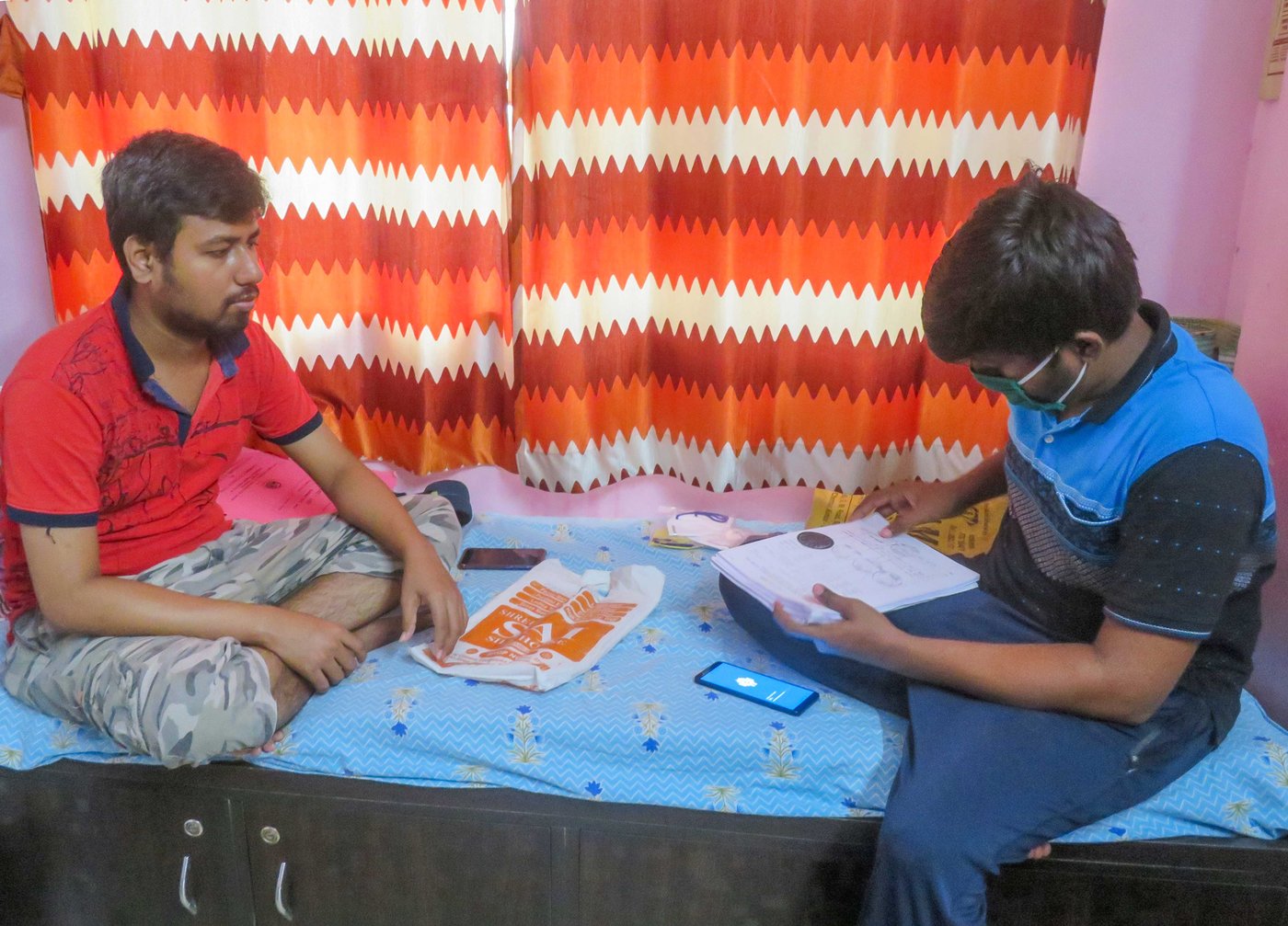
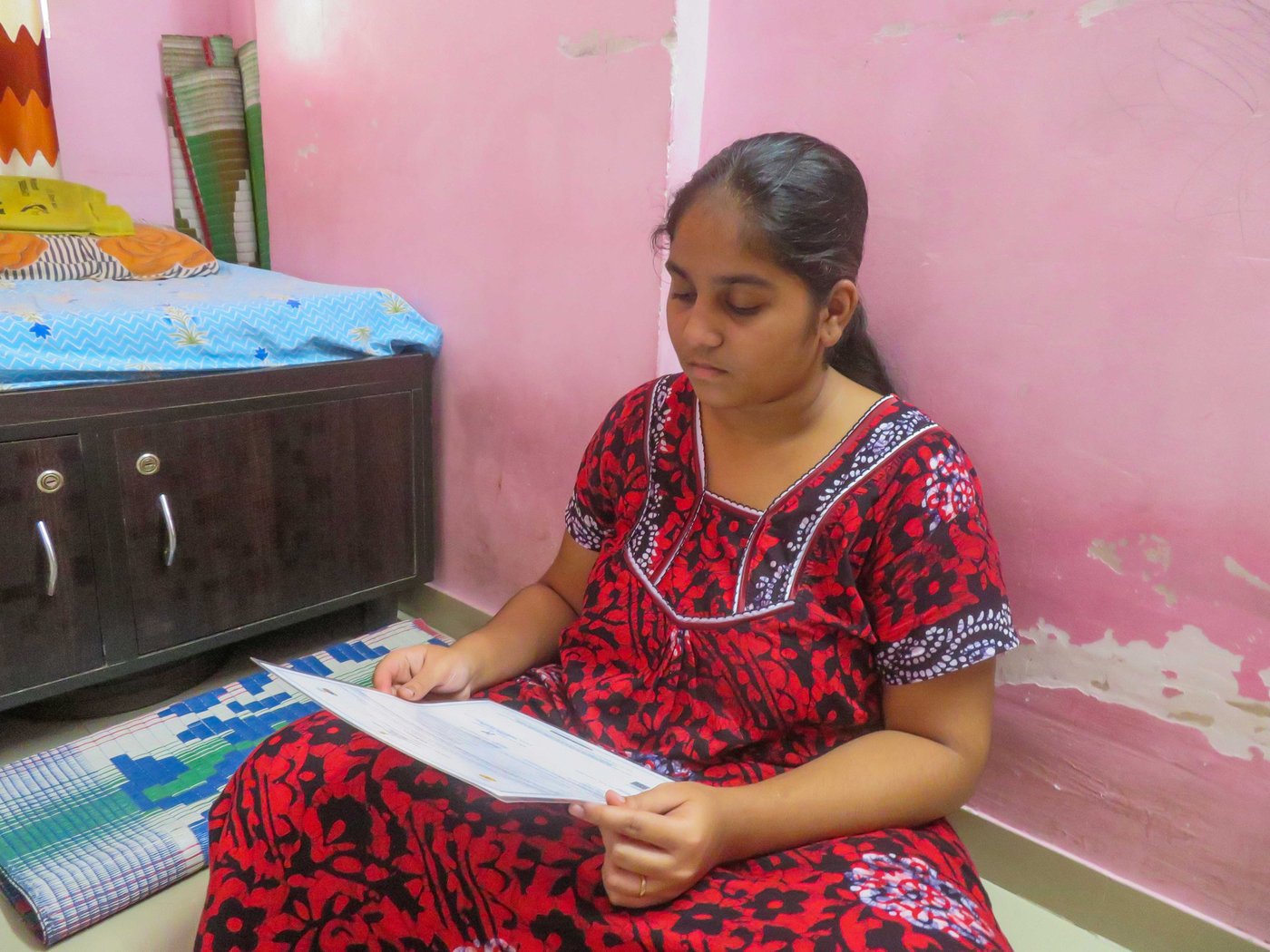
Since June, the Taare family has been making rounds – first of the hospital, to get the cause of death in writing, then of the BMC offices for the insurance cover
“Every hospital was saying that no beds are available,” says 21-year-old Nikesh, who completed his BSc two years ago and is looking for work. “We went to Rajawadi hospital, Joy hospital and K. J. Somaiya hospital. At K. J. Somaiya my father even told the doctor that he will sleep on the floor if necessary, and requested he be given treatment.” Ashok even showed his BMC employee identity card at every hospital – but that too didn’t help.
Finally, at Bhabha Hospital in Bandra, the doctors examined Ashok and took his swabs. “Then they took him to the Covid-19 isolation room,” says Swapnil.
When Manisha went that room to hand over a bag of Ashok’s clothes, toothbrush, toothpaste and soap, she recalls, “There was a strong smell of urine in the passage, plates of eaten food were lying on the floor. There was no staff outside the room. I peeped inside call out to my father to take his bag. He removed his oxygen mask, came to the door and took the bag from me.”
The doctors asked the Taare family to leave, saying that Ashok was under observation while his test results were awaited. That night, at 10 p.m. Sheela spoke to her husband on the phone. “I had no idea that I was listening to his voice for the last time. He said he is feeling good now,” she says.
The next morning, May 30, Sheela and Manisha went back to the hospital. “The doctor told us that your patient passed away last night at 1:15 a.m.,” says Sheela. “But I had spoken to him just the night before…”
Numb and in grief, at that moment the Taare family could not enquire about the cause of Ashok’s death. “We were not in our senses. Doing all the paperwork to take possession of the body, arranging for an ambulance and money, consoling mother – in all that we couldn’t question the doctor about Papa’s death,” Nikesh says.
Two days after Ashok’s funeral, members of the Taare family went to Bhabha hospital again asking to be given the for cause of death in writing. “For 15 days of June, we were just doing rounds after rounds of the hospital. The doctor would say the report was inconclusive, read Ashok’s death certificate by yourself,” says 22-year-old Vasant Magare, Ashok’s nephew.
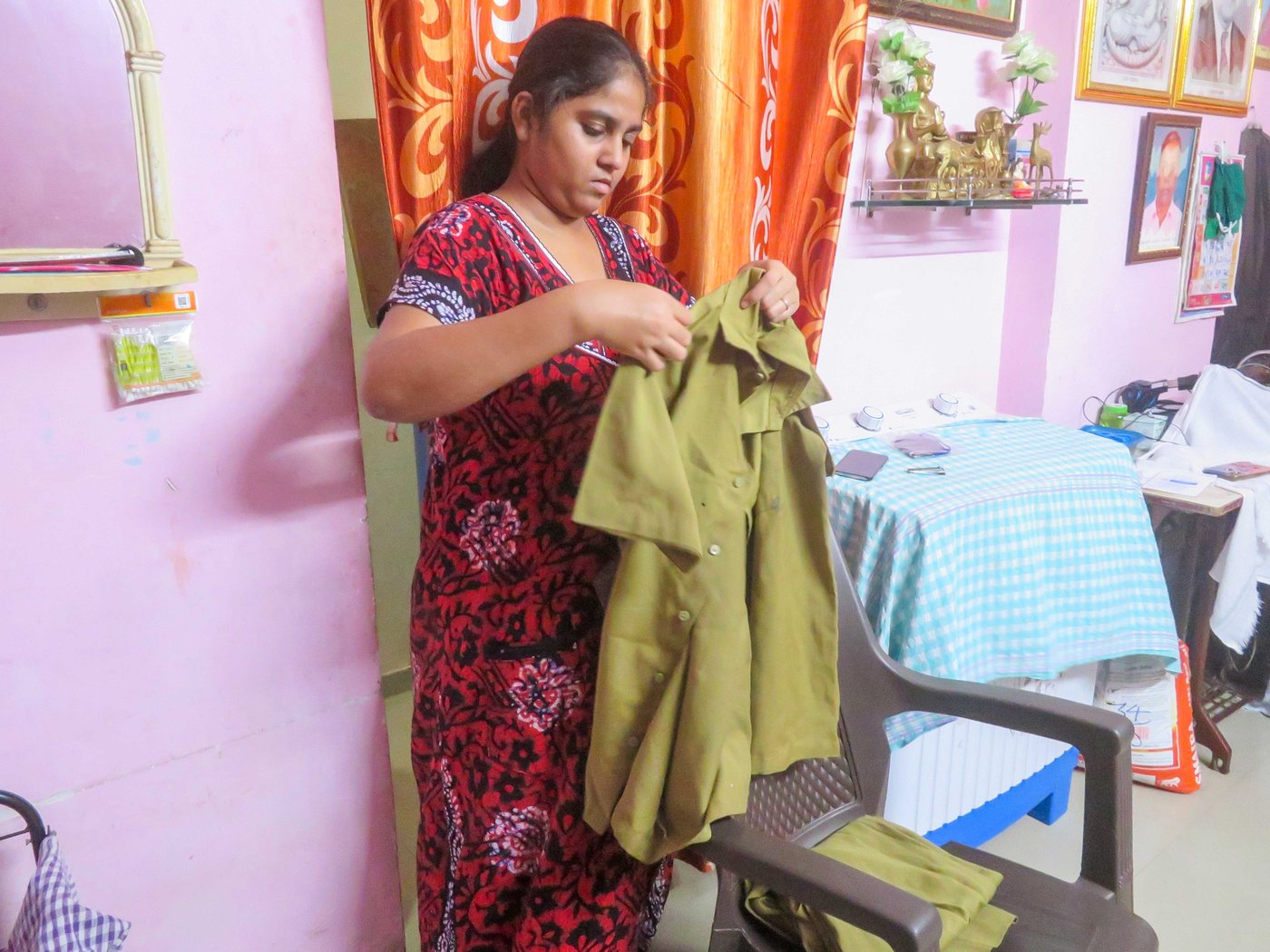
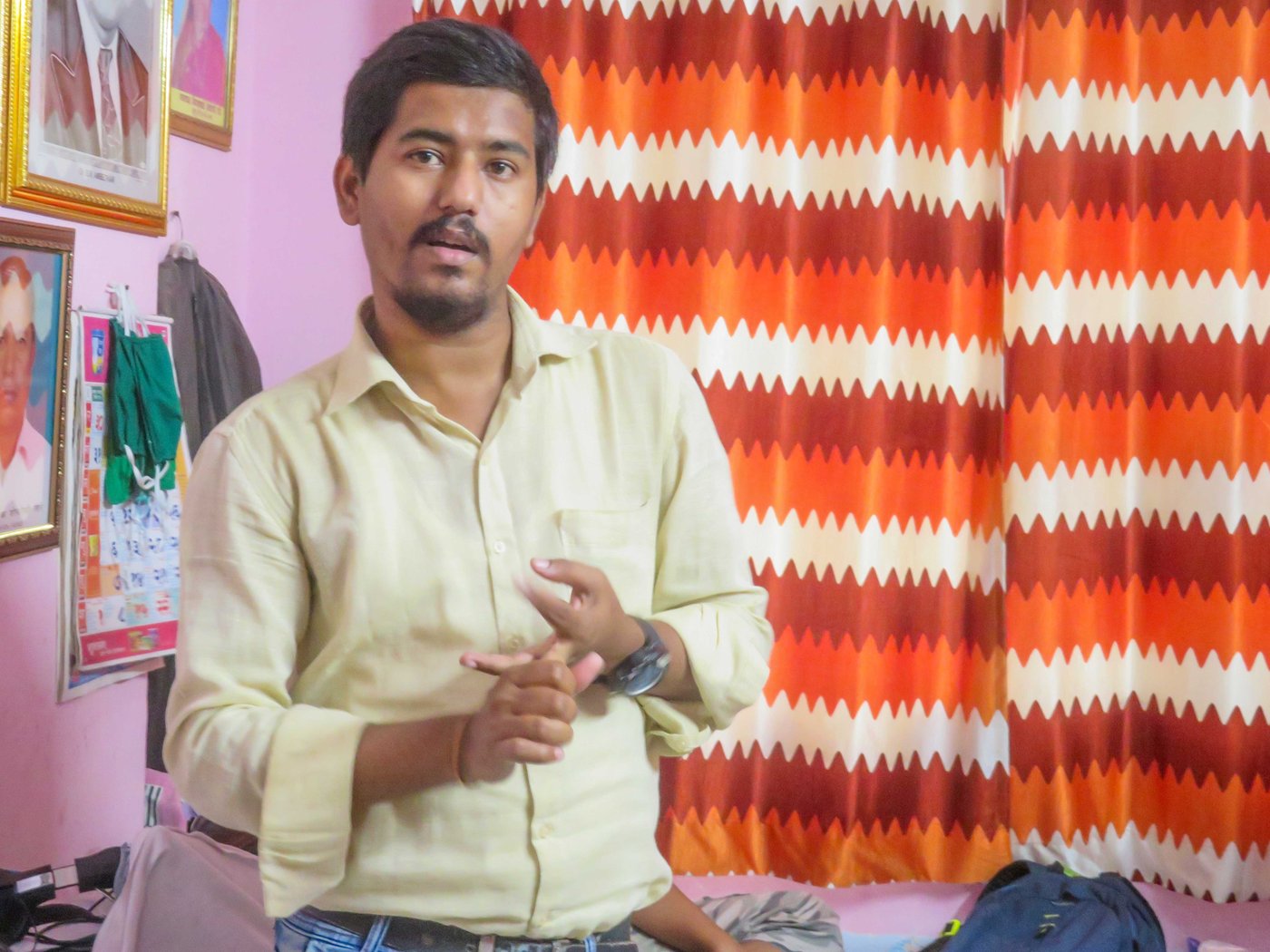
Left: 'We recovered, but Papa was still unwell', recalls Manisha. Right: 'The doctor would say the report was inconclusive...' says Vasant, Ashok’s nephew
On June 24, only after when BMC officials of T ward in Mulund (where Ashok was registered as an employee) wrote a letter to the hospital asking for the cause of death, the hospital administration gave this in writing: the cause was ‘suspected Covid-19’. The letter states that Ashok’s health deteriorated after he was admitted to the hospital. “On May 30, at 8:11 in the evening, Metropolis laboratory emailed us saying the throat swab is insufficient. And asked us to send the patient’s swab for testign again. But since the patient had already died, it was not possible to send swabs again. Therefore, while declaring the cause of death, we stated it to be ‘suspected Covid -19’.”
This reporter tried several times to contact the doctor who attended to Ashok at Bhabha Hospital, but he didn’t respond to the calls and messages.
To provide financial assistance to the families of ‘Covid-19 warriors’ such as Ashok, the Maharashtra government passed a resolution on May 29, 2020, following orders of the Ministry of Health and Family Welfare ‘to provide a comprehensive personal accident cover of Rs. 50 lakhs to all employees who are on active duty relating to survey, tracing, tracking, testing, prevention, treatment and relief activities for COVID-19 pandemic’.
On June 8, 2020, the BMC issued a circular to implement this resolution. The circular declares that the family of "any contractual labourer / outsourced worker / daily wager / honorary worker, who, while performing duties related to Covid-19, dies due to COVID-19” is entitled to get Rs. 50 lakhs under certain conditions.
The conditions include the worker being on duty for 14 days prior to hospitalisation or death – as was Ashok. If Covid-19 is not adequately tested or determined, the circular adds, a committee of BMCs officials will be formed to investigate the case history and medical papers in order to assess the possibility of the death being caused by Covid-19.
By August 31, shows data provided by the BMC’s Solid Waste Management department’s labour officer, of a total of 29,000 permanent workers 210 were found positive and 37 died, while 166 recovered and resumed duty. There is no record of contractual sanitation workers affected by the virus, said the official.
The families of 14 of the 37 sanitation workers who lost their lives have filed claims for the Rs. 50 lakhs compensation. Till August 31, 2 families had received the insurance amount.
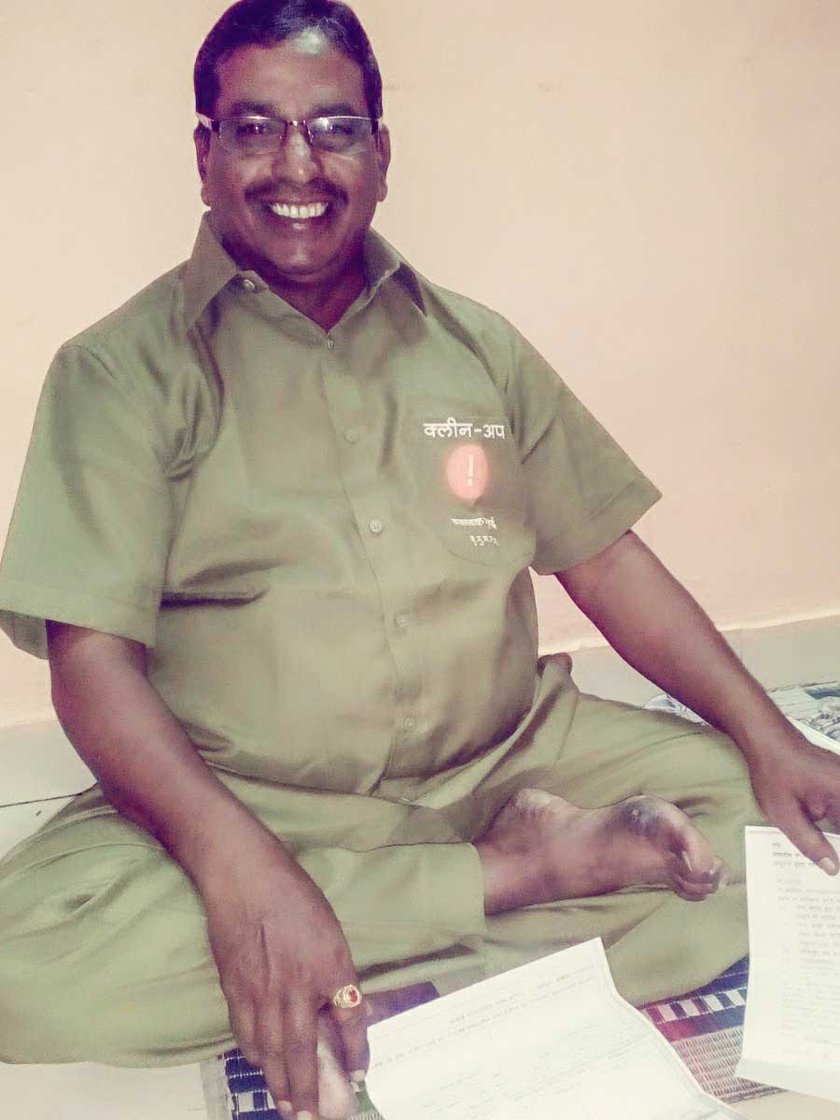
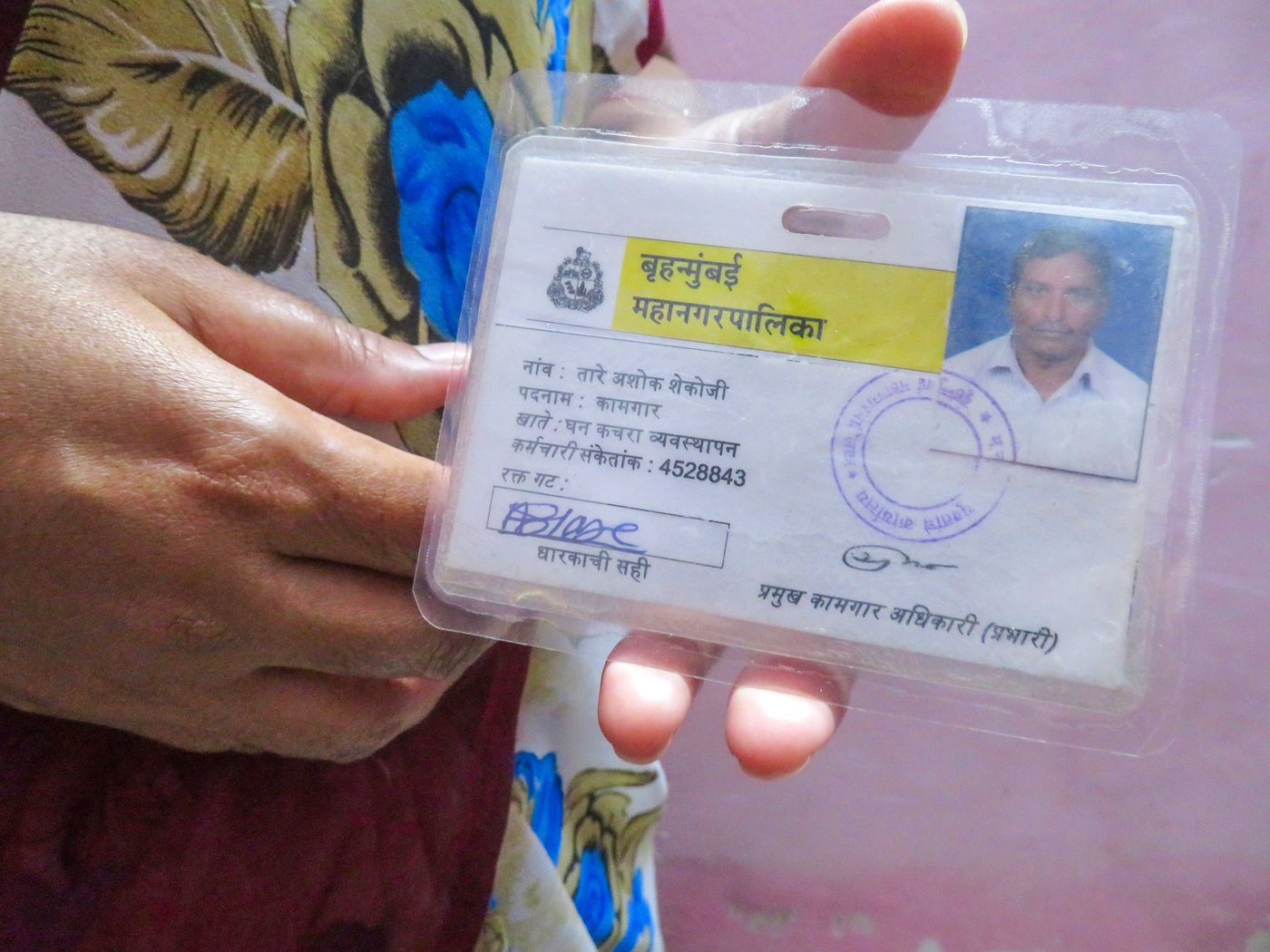
Ashok went from being a contractual to ‘permanent’ sanitation worker in 2016. 'We were able to progress step by step', says Sheela
After obtaining the written document about the cause of Ashok’s death, the Taare family began to make the rounds of the BMC’s T ward office to file their claim for the Rs. 50 lakhs insurance cover. The notary’s fees, photocopies, autorickshaw costs and other expenses have so far added up to over Rs. 8,000.
Unable to access Ashok’s salary account at the bank, Sheela says she mortgaged a half-tola gold earring for around Rs. 9,000. “Every time, the officials would ask for some changes in the paper after it was notarised. If not the 50 lakh rupees, the BMC should give my elder son a job in place of his father as per the norms,” she says, showing me all the files and paperwork.
When this reporter spoke with the Assistant Commissioner’s office in T ward on August 27, this was the response: “Yes, he was our employee and we have processed his file for the claim. A decision of forming enquiry committee of BMC's officials is awaited, the BMC is still working on it."
Ashok’s income sustained his family. From June, Sheela has started working as a cook in two homes in neighbouring buildings, earning a total of barely Rs. 4,000. “It is difficult to manage now. I never worked but now I must. Two of my children are still studying,” she says. Her elder brother, 48-year-old Bhagwan Magare, a contractual sanitation worker with the Navi Mumbai Municipal Corporation, has helped out with the pending monthly room rent of Rs. 12,000.
It was only in 2016 that Ashok had managed to become a ‘permanent’ sanitation worker and began receiving a monthly salary of Rs. 34,000, up from the Rs 10,000 he had earned until then as a contractual worker. “When he started earning a decent amount, we shifted to this SRA building from a slum in Mulund. We were able to progress step by step,” says Sheela.
With Ashok’s death, the Taare family’s progress has stopped. “We want the government to listen us. Why he was denied the leave? Why were he and other workers not even tested immediately?” asks Sheela. “Why was he forced to beg in hospitals to get admission? Who is really responsible for his death?”
